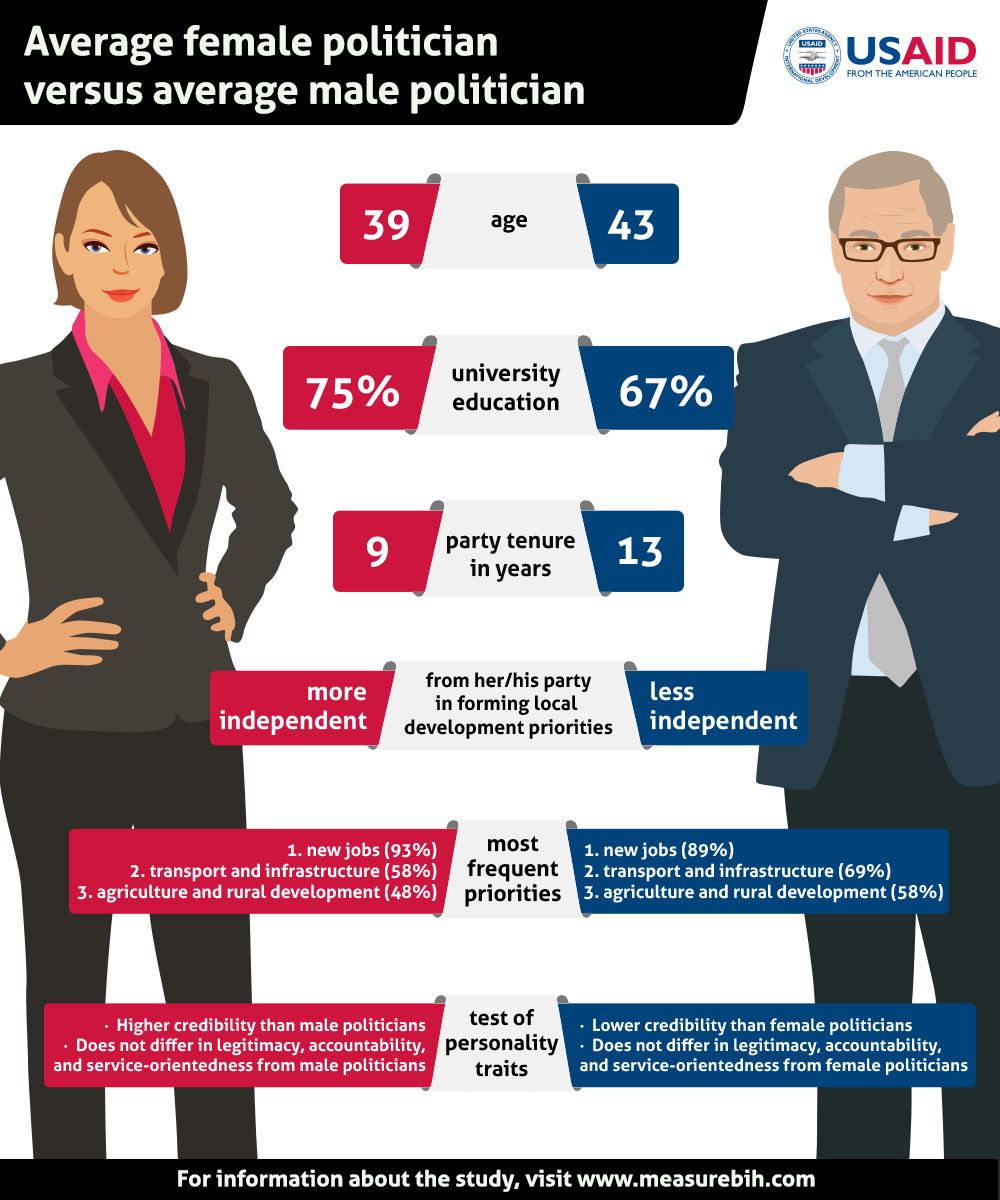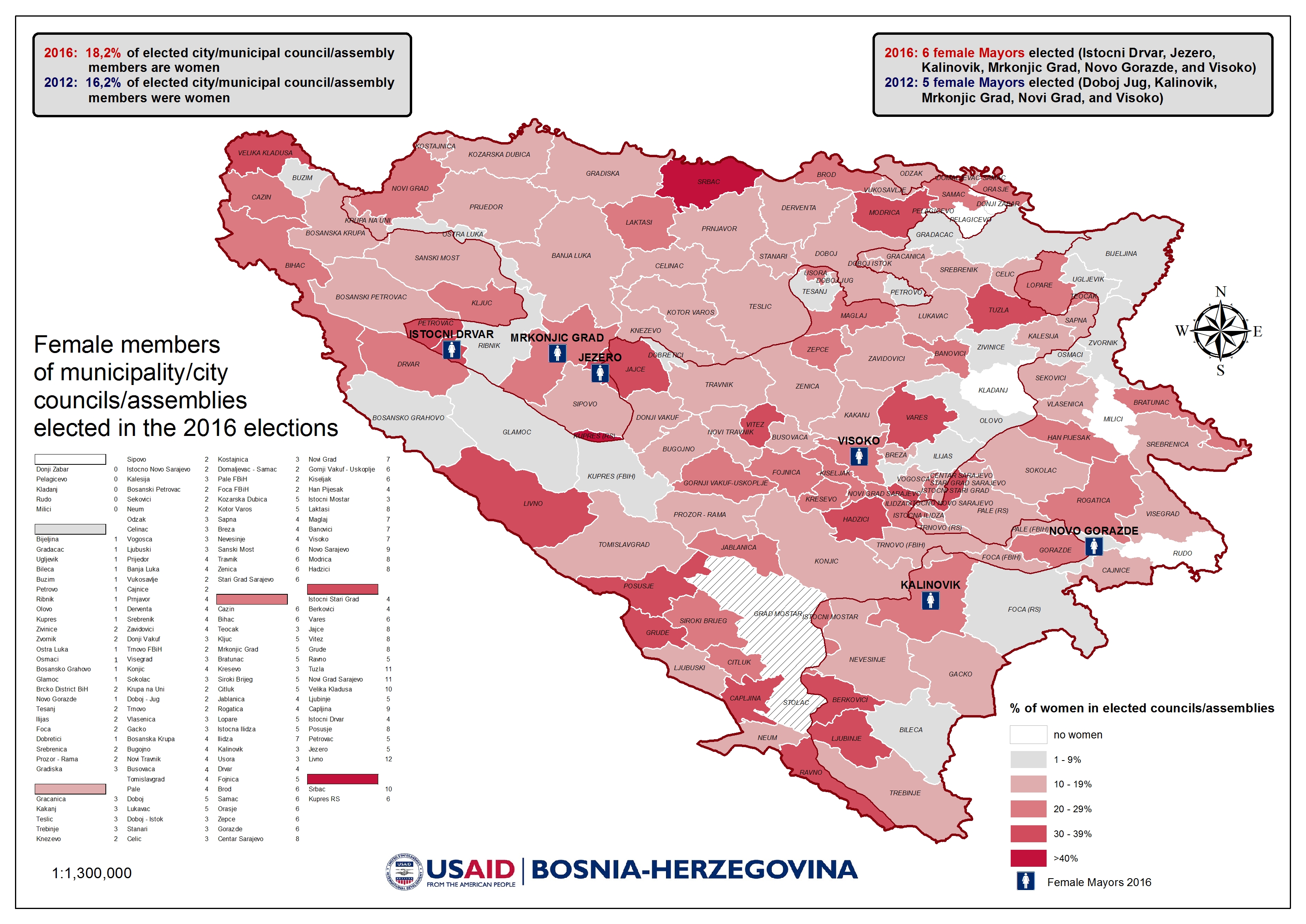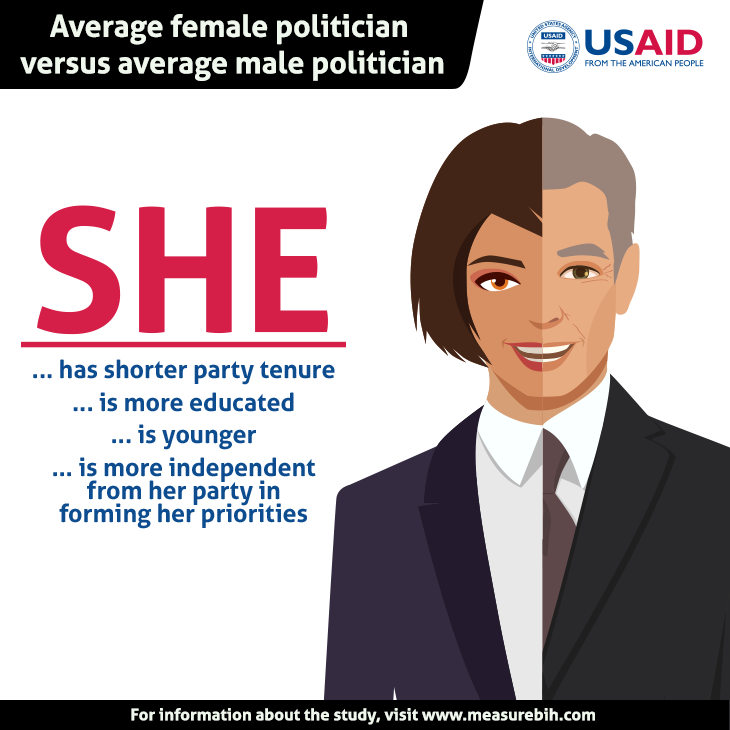
Why Do We Not Vote For Female Politicians? Are They Different From Male Politicians?
|
FEMALE POLITICIANS ARE WILLING TO FIGHT FOR THEIR OWN PRIORITIES! According to the confirmed results of the 2016 local elections published by the Central Election Commission, there has been a slight improvement in gender balance of elected politicians in comparison to the 2012 local elections. However, although improvement is reported in both elected mayors and elected council/assembly members, female representation is still nowhere near equal to male representation. Out of 140 municipal/city mayors elected in October 2016, only 6 are females (4.3%) compared to 5 females (3.6%) elected in 2012. This increase in number of female mayors is very small but important having in mind that number of female candidates for mayor position actually decreased from 39 in 2012 to 26 in 2016. Out of the six newly elected mayors, only one is in FBiH (Visoko) and five are in RS (Istocni Drvar, Mrkonjic Grad, Jezero, Kalinovik, and Novo Gorazde). Female representation at the level of council/assembly members is not much stronger. Out of 3,144 elected council/assembly members, only 566 are women. This share of 18.2% represents slight improvement compared to 16.2% in the 2012 local elections. The Election Law of BiH prescribes that 40% of each political party’s candidates must be female, thus gender inequality in political representation is not a result of lack of legal incentives, but rather a result of lack of citizens’ votes. Why do BiH citizens not vote for female politicians? Do female politicians really differ from their male counterparts or do voters have stereotypes about female politicians? Motivated by these questions, USAID’s MEASURE-BiH conducted a study on gender differences in development priorities within political parties. During August and September of this year, MEASURE-BiH collected data from political party branches in 19 municipalities/cities across BiH, by interviewing five men and five women from the top of the party lists of candidates for the municipal/city councils/assemblies in the this year’s local elections.
The results of the study show that female politicians, unlike their male counterparts, are more willing to advocate for priorities they consider more important for a better life in their communities than those presented by their parties! When asked to list their top five development priorities for their municipality/city, 60% of political candidates used only their party priorities. Among the remaining 40% who listed priorities that are not on the list of party priorities, female candidates are more likely to add their own priorities than male candidates.
When listed priorities are grouped in broad sectors, the differences between male and female politicians are not significant. For both male and female candidates the most frequent priority sectors are business environment improvement for job creation, transport and infrastructure, and agriculture and rural development. Overall, both male and female candidates prioritize social protection and economic affairs similarly, contrary to stereotype which asserts that female politicians prioritize social protection over economic affairs.
According to results of this study, female candidate are younger than their male colleagues (average age is 39 for female politicians and 43 for male politicians) and more educated (75% of female candidates and 67% of male candidates have university education). On the other hand, female candidates went into the local elections with shorter party tenure (9 years of party service compared to 13 years of their male colleagues) and believing more frequently than male politicians that they have no influence on the creation of the development priorities of the political party to which they belong (27% of female candidates think they have no influence on the party''''s priorities, compared to 17% of male candidates). At the same time, women on average make up only 30% of the membership in the party municipal/city branches. |
|
MEASURE-BiH also analyzed the personality traits of all female and male candidates in the sample to assess their political capacity to influence their parties’ development priorities and the associated gender gaps. Within the five dimensions of personality traits (credibility, legitimacy, accountability, service-orientedness, and power), there are no significant gender differences, except in the credibility dimension. Assessment indicates that female candidates on average have higher credibility than male candidates. Among the two sub-dimensions related to credibility, which are competence and integrity, it is integrity that is consistently higher for female candidates than male candidates, while no significant gender difference in competence has been noted. The results of the study also found no evidence of stereotype that traits related to power dimension differ across gender.
Thus, male and female politicians on average have very similar development priorities and personality traits, while female politicians exhibit higher integrity within personality trait test and are also more willing to fight for their own development priorities rather than only following the party priorities. If neither priorities nor personal traits of female and male politicians differ, perhaps female politicians have lower electability because of gender stereotypes?
 A survey of BiH citizens’ perceptions conducted by MEASURE-BiH last month indicates that gender stereotypes do exist in BiH. In a country-wide representative sample of over 3,000 households, almost 40% of citizens (47% of men and 32% of women) think that men make better political leaders than women and should be elected rather than women. Moreover, 27% of citizens (29% of men and 24% of women) believe that women are not good politicians because they are not assertive and dominant enough. Finally, a staggering 52% of citizens (56% of men and 48% of women) believe that public life activities are closer to man and private life activities to women. More information is available here. |






